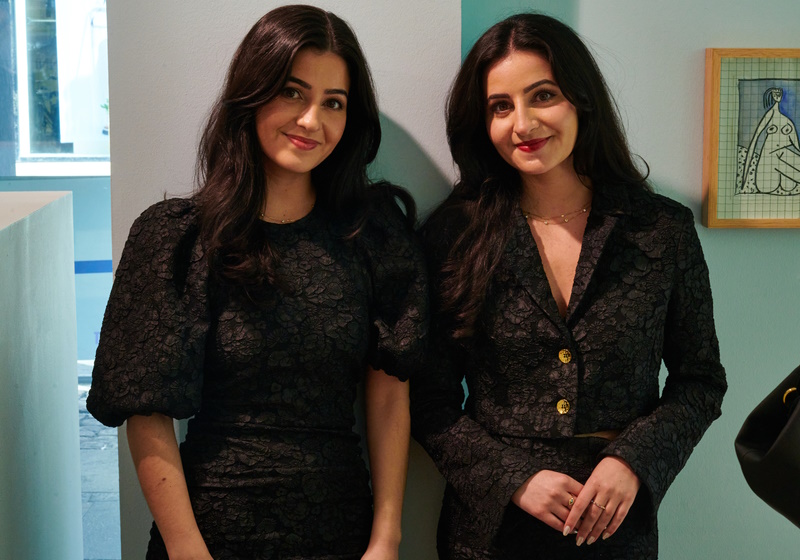Rubi Laboratories: The Beautiful Idea By Twin Beauties Towards A Beautiful Green Planet.
Rubi is offering a carbon-negative, zero-water, and zero-land alternative to the $15 billion viscose sector, which traditionally depends on wood pulp.

In today’s world, fashion plays one of the major aspects of everyone’s life. Everyone wants to cover them with those shiny, silky fabrics that enhance the personality of the individual. But let’s face it, silk is an expensive fabric; not everyone can afford it, so our scientists made a replica of it, the beautiful Rayon. But do you know how much air is harmed by the production of Rayon? Rayon may not be an environmentally friendly fabric due to the use of carbon disulfide in its production. Every ounce of carbon disulfide used in the production of Rayon fibres adds to the formation of a carbon footprint.
But what if we say that we have found a gemstone, ‘Rubi’, that will give you splendid textiles along with reducing the guilt of contributing towards carbon emission?
The above criteria are the theme of our next story, ‘The Rubi Laboratories’ and its founders. These twin sisters, Leila Mashouf and Neeka Mashouf, are increasing the charm of fashion by working on a way to transform carbon emissions from factories into textiles and hence delving into the route of clean and green air. Removing their weight in CO2 from the atmosphere and reversing climate change, Rubi creates natural textiles made 100% from carbon emissions, with virtually zero water and zero land used in the process.

Now, how is that possible? How can you take carbon dioxide from the air and turn it into clothes?
That’s what Rubi Laboratories Inc. is functioning on. The Sausalito startup has unleashed a way to convert carbon emissions into naturally biodegradable textiles. Rubi’s methods involve taking carbon ejected by manufacturing plants and converting it into viscose, which is also known as Rayon and is one of the world’s most popular textiles.
The insights of investment at Rubi Laboratories.
Rubi Laboratories has raised a total of $13.2M in funding over 4 rounds.
Rubi’s latest funding was raised on March 1, 2023, from a second Seed round. The money raised is $8.7M, the investors being Tin Shed Ventures, Talis Capital, Ponderosa Ventures, Necessary Ventures, Collaborative Fund and H&M Group Ventures.
The first seed round was raised on February 16, 2022, with $4.5M money raised. This round was led by Talis Capital and Necessary Ventures, with participation from the following.
- Climactic
- Collaborative Fund
- Plug and Play
- Incite Ventures
- Darco Capital
- Cayuse Partners
- Axial VC
- Climate Capital Collective
- CapitalX

A number of industry heads joined as angels, including
- Manny Mashouf, CEO and founder of Bebe Stores
- James Reinhart, CEO and founder of thredUP
- Nicolaj Reffstrup, founder of GANNI
- Alexander Lorestanti, CEO and co-founder of Geltor
- Rei Wang, the co-founder of The Grand and former CEO of Dorm Room Fund.
The round also contains a $250,000 grant from the National Science Foundation. The funding will boost Rubi’s R&D and commercialisation to satisfy the textile needs of major fashion brands.
The first capital drawn in Rubi was on November 30, 2021, in Convertible Note, given by Plug and Play Ventures.
The demand for such a great move.
Rubi is offering a carbon-negative, zero-water, and zero-land alternative to the $15 billion viscose sector, which traditionally depends on wood pulp. Viscose accounts for around 35% of major fashion labels’ SKUs, with this figure expected to rise by 8% every year through 2025. Viscose is the world’s third most used textile, having important applications outside of fashion in the automobile sector for goods such as tyres. While Rubi’s first focus will be on the garment industry, the company’s long-term goals include extending the same technology to other sectors, such as food, packaging, and building materials.
The startup obtained funds at a pivotal juncture in the fashion industry, as big companies set aggressive zero-carbon or carbon-reduction objectives by 2030. Overall, the fashion sector is the third-most CO2-polluting supply chain in the world, with the textile supply chain accounting for the majority of emissions. Despite the fact that today’s viscose and cotton textiles are derived from plants, their processing and manufacture generate more than 10kg of CO2 for every kg of textile.

Rubi’s technique allows its textiles to be net carbon-negative per kilogramme of fabric. There is enormous commercial pressure on fashion firms to become more sustainable: at least 60% of consumers of fashion want sustainable options, which means the sector may lose $52 billion in earnings by 2030 if nothing is done. The most pressing challenge for these firms is getting carbon-free materials that can be scaled to fulfil production requirements while maintaining price parity: 200 large fashion stores currently pay a premium for organic cotton.
How Rubi was born?
Raised amid the redwood woods and coastlines of Northern California, these twin beauties fell in love with trees and nature, the science of how they operate, and the materials from which they are produced, and both began scientific research careers at the age of 15. What’s the amusing twist? Their Uncle owned BeBe, the legendary retail shop many of us grew up with. So, with both nature and fashion in their veins, a vision was created.
Committed to battling the degradation of the world’s clean air, water, climate, land, and biodiverse ecosystems, these wonder ladies have created carbon-negative fabrics for the fashion industry literally out of air!
A brief about beauties with the brain.
The 25-year-olds have had exceptional careers in research and technology, and they are working together to build and commercialise their idea by integrating their abilities in biology, material science, and business.

Neeka quit her Silicon Valley career as a Product Engineer to create and run the firm, with her sister Leila following shortly after as Chief Technology Officer, pausing her medical studies at Harvard University.
When asked about the firm that was founded in August 2020, which was in the middle of a global pandemic, this is what the founder, Neeka, said.
One thing she was always inspired by was Isaac Newton about how he discovered calculus during the Great Plague. It was like these pandemics, where people are quarantined; even throughout history, they have been very pivotal and inspiring. She realised that there was a time. It took a while to build it on the side; she used her salary to fund all of their work and then finally was able to go full-time. Isn’t that an inspiring story for all the girls and guys out there?
Making justified use of social media.
Going viral is a double-edged sword. At times when there is a plethora of harm done by social media and the undue desire to go viral by youngsters, these twin beauties have effectively used TikTok to spread the message of climate awareness and display their ideas of green and clean textiles. The content that they created just for fun garnered immense engagement from the audience, and they found that people were interested in using their materials, joining the company, interning and many more. That’s what we can say is the justified use of social media.
Conclusion.
The creators indeed saw themselves as constructing the future of decarbonised supply chains, shifting away from the harmful supply networks of the past and towards those that may genuinely be planet-positive and symbiotic. So they’re starting with fashion, but in the future, they’ll be able to use this technological platform to create a variety of other things, such as proteins, lipids, and carbohydrates. These are the building blocks of all Earth’s materials, such as food, medications, packaging, and so much more. And all of these supply networks need to be reimagined, and they’re eager to take the lead.
Bharat is heading towards the biggest event of the year this September, aka the G20 summit. On the one hand, where the world leaders are focused on one of the most prominent aspects of development- green development, the other hand is filled with these new-age entrepreneurs establishing sustainable businesses that will pave the way towards a better planet. Furthermore, this month marks one of the great days to reduce carbon emissions and accelerate green development growth, i.e., Zero Emissions Day, observed on September 21. So, let’s celebrate the idea of these young entrepreneurs and pray for their successful transition that will take us to a better, cleaner world.




